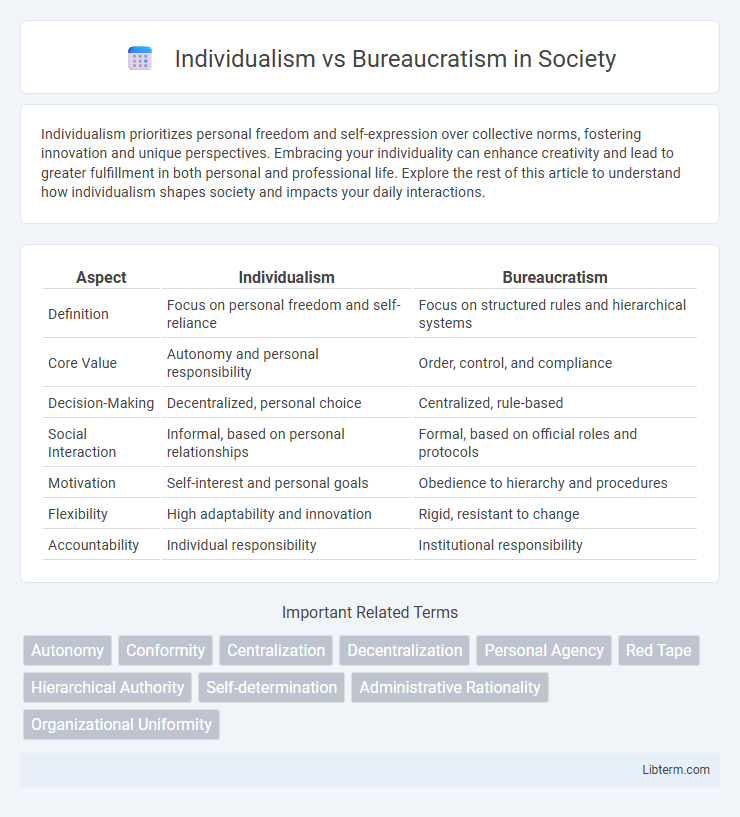Individualism prioritizes personal freedom and self-expression over collective norms, fostering innovation and unique perspectives. Embracing your individuality can enhance creativity and lead to greater fulfillment in both personal and professional life. Explore the rest of this article to understand how individualism shapes society and impacts your daily interactions.
Table of Comparison
| Aspect | Individualism | Bureaucratism |
|---|---|---|
| Definition | Focus on personal freedom and self-reliance | Focus on structured rules and hierarchical systems |
| Core Value | Autonomy and personal responsibility | Order, control, and compliance |
| Decision-Making | Decentralized, personal choice | Centralized, rule-based |
| Social Interaction | Informal, based on personal relationships | Formal, based on official roles and protocols |
| Motivation | Self-interest and personal goals | Obedience to hierarchy and procedures |
| Flexibility | High adaptability and innovation | Rigid, resistant to change |
| Accountability | Individual responsibility | Institutional responsibility |
Defining Individualism and Bureaucratism
Individualism emphasizes personal autonomy, self-reliance, and the primacy of individual rights and freedoms in social and political contexts. Bureaucratism refers to the rigid adherence to formal rules, hierarchical structure, and standardized procedures within organizations or institutions, often prioritizing collective order over individual discretion. Understanding the tension between individualism and bureaucratism reveals contrasting approaches to governance, decision-making, and social organization.
Historical Roots of Both Systems
Individualism traces its historical roots to Enlightenment thinkers like John Locke and Jean-Jacques Rousseau, emphasizing personal freedom, self-reliance, and the intrinsic rights of individuals. Bureaucratism, on the other hand, emerged with the rise of centralized states and industrialization, epitomized by Max Weber's theory of rational-legal authority and structured administrative systems. The tension between these systems reflects a broader historical evolution from decentralized, autonomous decision-making toward standardized, rule-based governance in complex societies.
The Core Values of Individualism
Individualism prioritizes personal autonomy, self-reliance, and individual rights as foundational core values, emphasizing the importance of freedom and personal responsibility in social and economic contexts. It supports creativity, innovation, and unique expression, rejecting conformity and centralized control inherent in bureaucratism. This value system fosters environments where individuals have the liberty to pursue their goals and make independent decisions, driving progress through personal initiative.
Principles Underlying Bureaucratism
Bureaucratism is grounded in principles of hierarchical authority, formal rules, and standardized procedures that prioritize organizational control and predictability over individual autonomy. It emphasizes impersonality, where roles and responsibilities are clearly defined to reduce personal biases and ensure consistent decision-making. This framework supports efficiency in large organizations by promoting accountability and systematic coordination of tasks.
Advantages of Individualism in Modern Society
Individualism in modern society promotes personal freedom, creativity, and innovation by encouraging individuals to think independently and take initiative. It fosters a diverse range of perspectives and solutions in business and cultural contexts, enhancing adaptability and problem-solving. Emphasizing individual rights and responsibilities supports a meritocratic environment where talent and effort are rewarded, driving social and economic progress.
Strengths and Weaknesses of Bureaucratic Structures
Bureaucratic structures offer clear hierarchies and standardized procedures that enhance efficiency and accountability in large organizations. However, their rigid rules and formalization can stifle innovation, reduce flexibility, and slow decision-making processes. While promoting stability and predictability, bureaucracies may also lead to employee dissatisfaction and impersonal interactions due to excessive adherence to policies and regulations.
Individualism vs Bureaucratism in the Workplace
Individualism in the workplace encourages personal initiative, creativity, and autonomy, fostering a culture where employees take ownership of their tasks and innovate independently. Bureaucratism, characterized by rigid rules, hierarchical structures, and standardized procedures, often limits flexibility and may stifle individual creativity. Balancing individualism with necessary bureaucratic controls can enhance employee motivation while maintaining organizational efficiency and accountability.
Effects on Innovation and Creativity
Individualism fosters innovation and creativity by encouraging personal initiative, diverse thinking, and risk-taking, which leads to unique problem-solving and breakthrough ideas. Bureaucratism often stifles creativity through rigid procedures, hierarchical decision-making, and a focus on conformity, resulting in slower adaptation and reduced flexibility in innovative processes. Organizations balancing individual autonomy with structured systems tend to maximize creative output while maintaining operational efficiency.
Social Implications and Cultural Impacts
Individualism emphasizes personal autonomy and self-expression, fostering innovation and diverse cultural identities but potentially weakening communal ties and social cohesion. Bureaucratism prioritizes structured organization and rule adherence, promoting stability and equal treatment but often leading to rigidity and reduced individual creativity. The tension between these paradigms shapes societal values, influencing social behavior, cultural norms, and the balance between freedom and order in communities.
Striking a Balance: Finding the Middle Ground
Striking a balance between individualism and bureaucratism requires integrating personal autonomy with structured organizational frameworks to enhance innovation without sacrificing efficiency. Emphasizing flexible policies that encourage employee creativity while maintaining clear procedures fosters a dynamic yet orderly work environment. Research shows that organizations blending these approaches experience higher job satisfaction and improved performance metrics.
Individualism Infographic

 libterm.com
libterm.com